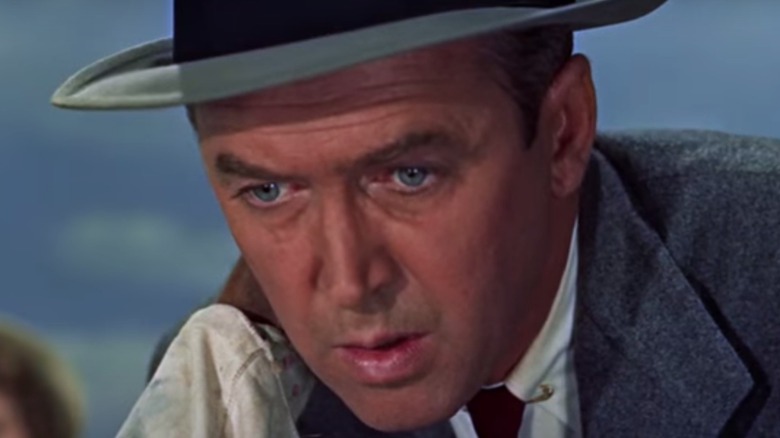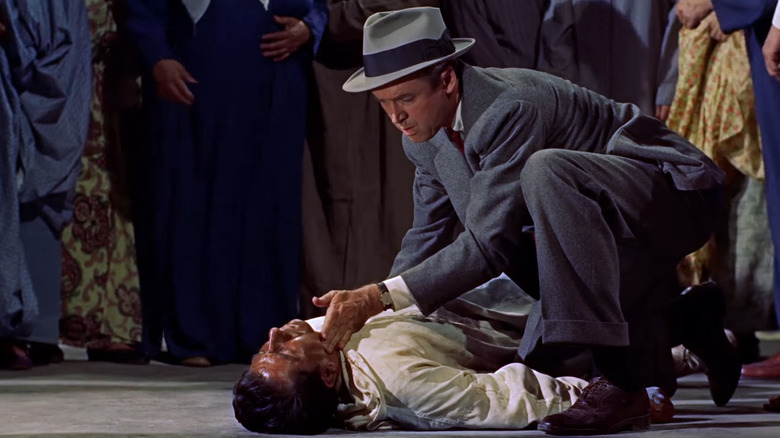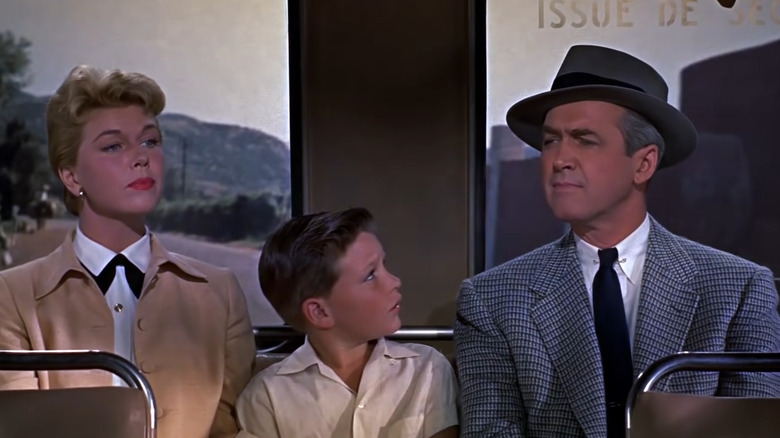The Ending Of The Man Who Knew Too Much Explained
It's probably safe to say that Alfred Hitchcock made movies like no one else had and arguably, still hasn't been topped. His iconic filmography, including such works as "Vertigo," "Strangers on a Train," "North by Northwest," "Psycho," and "Frenzy," just to name a few, have often been regarded as some of the best movies ever made. One of the most curious examples of his work is the 1956 thriller "The Man Who Knew Too Much," starring James Stewart (above) and Doris Day. The film tells the story of a family going on vacation in Morocco, only for the father, Dr. Ben McKenna (Stewart), to accidentally be given information regarding an assassination plot. Their son is kidnapped to keep them from telling the authorities and they do everything they can to save the child.
The director's only remake, reimagining his own 1934 film of the same name, "The Man Who Knew Too Much" is probably best known for the Oscar-winning Doris Day song, "Whatever Will Be, Will Be (Que Sera, Sera)." When comparing to the original film, it's obvious that Hitchcock's skills as a director and storyteller had matured significantly, with the filmmaker even stating, "Let's say the first version is the work of a talented amateur and the second was made by a professional."
Nevertheless, Hitchcock's distinct directorial and storytelling trademarks are present throughout the film. The director brings his A-game to craft some juicy moments and themes that find their way to effecting the film's outcome. So let's not keep you in suspense any longer and dive deep into this film.
Wrong place, wrong time
The opening text that follows the credit sequence probably explains it best: "A single crash of Cymbals and how it rocked the lives of an American family." Like much of Hitchcock's work, "The Man Who Knew Too Much" deals with an ordinary everyman who is thrust into a wild situation. Just the few words regarding the assassination, spoken to Ben by Bernard, an intelligence officer who befriends the family early on in the film, are enough to trigger the series of bonkers events that follow. It's easy to identify with the protagonists and feel for their plight, not only in being put into such a scenario, but also for the very real moral choices that arise. What's the more important option: preventing the assassination, or saving their son?
The movie also showcases the potential of the everyman to shine through seemingly insurmountable odds. This is evident toward the end, when we see the family's ingenuity come to the forefront. After having saved the foreign prime minister from being assassinated at the opera, Ben and Jo (Day) are granted admission into the foreign embassy, where they believe their son, Hank, to be. There, Jo performs a song at the piano for the attendees.
She proceeds to sing "Que Sera Sera" at the top of her lungs, hoping that Hank will hear his mother's voice from somewhere in the building and respond. Their plan works, as Hank whistles the song in response from an upper level, which aids Ben in finally freeing his son. Hitchcock proves that sometimes even the simplest solutions from seemingly ordinary people can result in triumph over the odds.
The murder that brought a family together
Hitchcock's films are drenched in dark humor that gives them a level of self-awareness that was ahead of their time. Here is no different, as it appears the hairy situation managed to not only save the prime minister, but the family unit as well. While it would be a stretch to call Ben and Jo's relationship on a total downward spiral, there is nevertheless a good bit of bickering between the two that presents conflict within their relationship early on.
When their son goes missing, however, the two take their own steps in trying to unravel the sinister plot. As the film progresses, they work more with one another, each one challenging their typical familial roles in the process. This is especially true for Jo, to whom Ben is condescending early on. By the end, it is quite literally her voice that saves them on numerous occasions, whether that's her well-timed scream that saves the prime minister from being shot or singing loudly at the embassy for Hank to hear. The very last line of the film taps in even further to its darkly comedic sensibilities, when Ben announces to his sleeping hotel visitors, "I'm sorry we were gone so long, but we had to go over and pick up Hank."
Much like Hitchcock's previous film, "Rear Window," "The Man Who Knew Too Much," in its own twisted way, uses the macabre situation to not only act as a hurdle to the family's plans but frames it as an opportunity to bring them closer together. They realize how much they mean to one another and go to extreme lengths to ensure one another's safety.


